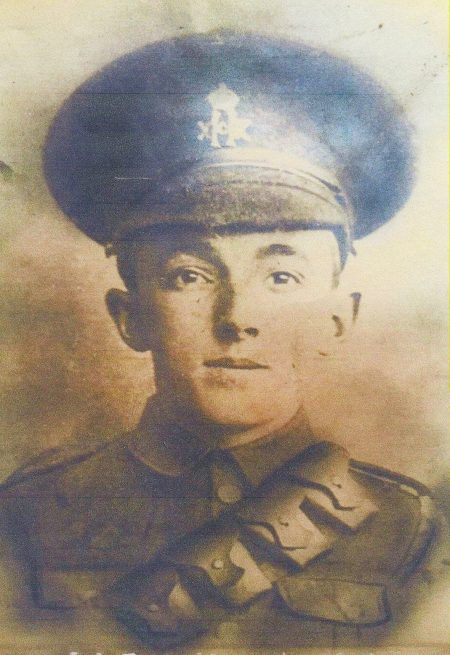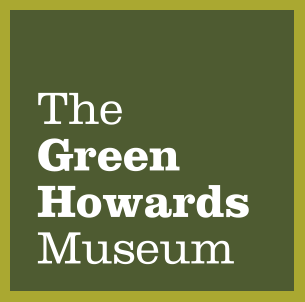
Robin Snook provided this information about his great uncle, Robinson Tweedy.
3412/200048 Private Robinson Tweedy of the Yorkshire Regiment went to war with his younger brother, Charles from their home in Kirkby Fleetham. He was wounded in February 1916 near Ypres, receiving a gun shot wound to the abdomen. He was honourably discharged and returned home. he died on 14 December 1918 from his wound and laid to rest in Great Fencote’s churchyard.

Medical record detailing Robinson’s injury

Robinson Tweedy’s medal card
Explore more memories from the ribbon
-
George Ellis
Submitted by Pauline Blewis. George was born in Old Malton and joined the Green Howards in around 1905. In the same year he married Annie Hemstock, a Richmond girl. Their family of three sons and a daughter were raised in the barracks, now the Garden Village. George served during the Boer War and during the First World War was transferred to the 13th Battalion (October 1915)- the battalion was made up of ‘Bantams’. George served through the war up to the Battle of Cambrai. On 23rd November 1917 he was sent up to the front line with his battalion with the aim of taking Bourlon Wood and village. Tanks were sent in with the infantry following up, eventually the village was taken after hand to hand fighting. George died during this advance and while his body was never found his name is inscribed on Panel 5 of the Cambrai Memorial. After his death the family were moved from the barracks into a house inside Richmond Castle.
-
Clement Rose
Clement Rose was the son of John and Mary Rose of Monkwearmouth, Sunderland. His father was a mast-maker. He enlisted in the East Yorkshire Regiment in October 1914 at the age of 17. His elder brother was serving with the Yorkshire Regiment and claimed Clement for them. The 8th Battalion left for France in late August 1915 and on October 11th they relieved the 11th Sherwood Foresters Regiment in trenches at Rue Marles. 15734 Private Clement Rose was killed in action on the 13th, one of the 8th Battalions first casualties. He was buried at Desplanque Farm Cemetery, La Chapelle-D’Armentieres and left his effects to his mother, £2-10s and a gratuity of £3.
-
Blackbird Baggott
Howard Muckle a resident of Richmond for the last 50 years (via Corbridge and Newcastle) provided this story of his grandfather, Blackbird Baggott. Blackbird Baggott (named after his mother Jane Blackbird) joined the Hawke Battalion of the Royal Naval division in 1915 and served at Gallipoli as an infantryman between May and August that year. The British Royal Naval Division was made up of men from the Royal Navy and its reserve forces. These men, who were not needed at sea, fought on land alongside the Army during World War One. The records cover more than 50,000 officers and ratings who joined the Royal Naval Division or who passed through Crystal Palace, London when it was used as an initial training centre during the First World War. Blackbird was transferred to the Army Service Corps and then the Royal Flying Corps as a Fitter from 1916 to 1919. After being demobbed in 1920 he married and had two children but rejoined the RAF in 1923 (with service number 47402). He served with 1 Squadron, 55 Squadron in Iraq from 1926 – 28, and then 503 Squadron in the UK, with whom he was serving when he died in 1935. His death certificate stated Blackbird Baggott died of Malnutrition whilst based on a training camp at RAF Halton.
